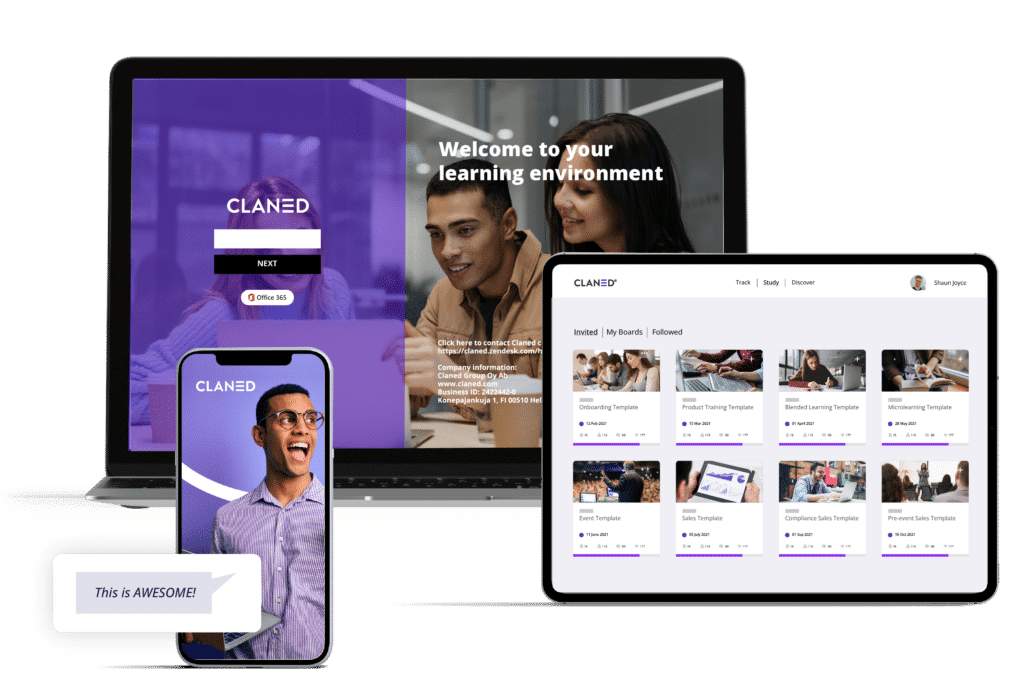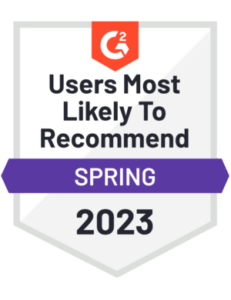In today’s fast-paced and ever-evolving business landscape, continuous learning and professional development have become essential for organizations to stay competitive.
And when it comes to managing and delivering training programs, Human Resources (HR) departments play a crucial role. That’s where HR Learning Management Systems (LMS) come into the picture.
An HR LMS system is a powerful tool that helps HR professionals streamline and enhance their training initiatives. It provides companies with a centralized platform to create, deliver, and track learning programs for their employees.
From onboarding new hires to upskilling existing staff, HR LMS systems offer a wide range of features and functionalities to meet the diverse learning needs of organizations.
Finding the right HR LMS system can be a daunting task amidst the sea of options available in the market. To help you navigate through this process and make an informed decision, we have curated a list of the top 5 HR LMS systems that stand out for their features, user-friendliness, and customer satisfaction.
Whether you’re a small startup or a global enterprise, these systems offer comprehensive solutions to meet your organization’s unique learning and development needs.
Lets dive into the top 5 HR LMS systems
What is LMS system in HR?
A Learning Management System (LMS) is a software tool that enables HR professionals to effectively manage employee training and development programs.
It provides a centralized platform for creating, delivering, and tracking online training courses, as well as managing learning materials, assessments, and certifications.
An HR LMS system serves as a digital hub for HR departments to streamline employee learning and ensure compliance with training requirements.
Features Of HR LMS Systems
HR LMS systems offer various features and functionalities that facilitate employee learning and development. Some key features include:
- Course creation and management: An HR LMS system allows HR professionals to create and manage online courses for employees. They can organize content, such as videos, presentations, and quizzes, into structured learning modules. This makes it easy to develop interactive and engaging training materials.
- Learning material repository: HR LMS systems provide a centralized repository for storing and accessing learning materials. This enables HR departments to maintain a library of resources, such as documents, PDFs, videos, and presentations, which employees can access when needed.
- Employee self-enrollment: With an HR LMS system, employees can self-enroll in training courses based on their learning needs and development goals. This empowers employees to take charge of their own learning and ensures they have access to relevant training materials.
- Assessment and tracking: HR LMS systems enable HR professionals to create and administer assessments to evaluate employee knowledge and skills. These systems also track employee progress and provide detailed reports on course completion, scores, and performance metrics. This helps HR teams identify areas where additional training may be needed.
- Certification and compliance tracking: An HR LMS system allows HR departments to track employee certifications and ensure compliance with industry regulations. It automatically sends reminders for certificate renewals and provides a record of employee compliance.
- Integration with other HR systems: Many HR LMS systems integrate with other HR systems, such as performance management and talent management software. This allows for seamless sharing of employee data and simplifies the process of aligning training and development programs with organizational goals.
Benefits of HR LMS System to an Organization
- Streamline training processes: By automating and centralizing training activities, HR LMS systems streamline the process of creating, delivering, and tracking employee training. This saves time and effort for HR professionals, allowing them to focus on strategic HR initiatives.
- Enhance employee engagement: Interactive and user-friendly learning modules in an HR LMS system help in increasing employee engagement and knowledge retention. Employees can access training materials at their own pace and convenience, leading to a more flexible and engaging learning experience.
- Ensure compliance: An HR LMS system assists in maintaining compliance with industry and regulatory requirements. By tracking certifications and providing audit trails, HR departments can ensure that employees receive the necessary training to meet legal and safety standards.
- Drive performance improvement: A well-designed training program facilitated by an HR LMS system can boost employee performance and productivity. By providing targeted learning opportunities, organizations can help employees develop new skills, increase their efficiency, and contribute more effectively to their roles.
By investing in a reliable HR LMS system, organizations can empower their HR teams to effectively manage employee learning and development programs.
Why do HR need LMS?
In today’s fast-paced and dynamic work environment, Human Resources (HR) professionals face the challenging task of managing and developing their workforce effectively. This is where a Learning Management System (LMS) can play a crucial role. An HR LMS is a software platform that enables organizations to centralize, manage, and deliver training and development programs to their employees.
Here are some key reasons why HR departments need an LMS:
1. Streamline Training Processes
One of the primary reasons why HR departments need an LMS is to streamline their training processes. With a centralized platform, HR professionals can easily create and administer training programs, track employee progress, and generate comprehensive reports.
An LMS eliminates the need for manual processes such as scheduling and tracking training sessions, ensuring a more efficient and organized approach to training management.
2. Increase Efficiency and Productivity
Implementing an HR LMS can significantly increase the efficiency and productivity of the HR department. By automating routine tasks such as course enrollment, reminders, and progress tracking, HR professionals can focus on strategic initiatives rather than spending valuable time on administrative tasks.
This not only saves time but also improves overall productivity within the organization.
3. Ensure Compliance and Standardization
Compliance with industry regulations and internal policies is crucial for organizations. An LMS enables HR departments to ensure compliance by delivering training programs that are standardized and up-to-date.
By tracking employee completion rates and generating compliance reports, HR professionals can demonstrate their commitment to regulatory requirements and maintain a culture of compliance within the organization.
4. Enhance Employee Development and Engagement
Investing in employee development is vital for attracting and retaining top talent. With an LMS, HR departments can create personalized learning paths for employees, providing them with access to relevant training materials and resources.
This not only enhances their skills and knowledge but also fosters engagement and a culture of continuous learning within the organization. Employees can also track their own progress and take ownership of their development journey through the LMS platform.
5. Foster Collaboration and Knowledge Sharing
An LMS can facilitate collaboration and knowledge sharing among employees. Through discussion forums, social learning features, and interactive training modules, employees can connect with their peers, share insights and best practices, and learn from each other.
This not only strengthens relationships within the organization but also promotes a culture of collaboration and innovation.
HR Learning Management System (LMS) can bring numerous benefits to HR departments. From streamlining training processes to increasing efficiency and productivity, ensuring compliance, enhancing employee development and engagement, and fostering collaboration and knowledge sharing, an LMS is a valuable tool for HR professionals.
By implementing an LMS, HR departments can effectively manage and develop their workforce, ultimately contributing to the overall success of the organization.
5 Top HR LMS System
#1: Claned
Claned is a comprehensive HR Learning Management System (LMS) that offers a wide range of features and course creation tools designed to enhance the learning experience for employees and managers alike. With its user-friendly interface and robust functionality, Claned has become one of the top choices for HR departments looking to create and deploy their training and development programs.
Claned is a cloud-based corporate LMS that maximizes learning outcomes for businesses by combining AI, collaborative learning, and world-class pedagogy.
It features an intuitive, easy-to use course builder that helps organisations set up effective courses quickly. It also generates AI-powered learning insights and recommendations that showcase and improve the value of corporate training programs. Lastly, it uses pedagogical insights to drive home the skills and knowledge that employees learn during trainings.
See Claned in a nutshell below
Claned Price Point:
Free One Month Trial Available, Try Clane Now
Based on the number of users, Claned offers three pricing plans:
Starter (50 users per month): €196.00
Professional (150 users per month): €500.00
Expanded (300 users per month): €956.00
We offer up to 50% discount to NGOs, Custom quotes are also available for more users and specific requirements. Book Demo Here
#2: AbsorbLMS
AbsorbLMS is a learning platform with a focus on helping organisations train and skill employees to keep up with the demands of today’s fast-paced world. This cloud-based corporate LMS is designed to fit the needs of organisations of various sizes and boost business productivity and mission.
AbsorbLMS boasts of a wide list of features and is a part of the Absorb suite of corporate products that you can use in your nonprofit organization.
AbdorbLMS Price Point:
Unfortunately no pricing disclosure by the team.
#3: 360Learning
360Learning is a modern HR learning management system that focuses on collaborative learning and engagement. It offers a user-friendly platform that enables organizations to create, deliver, and track training courses. With its intuitive interface and advanced features, 360Learning aims to revolutionize the way businesses approach learning and development.
One of the standout features of 360Learning is its emphasis on collaboration. The platform allows for social learning, enabling employees to interact and share their knowledge and expertise. This collaborative approach fosters a culture of continuous learning and encourages employees to take an active role in their professional development.
360Learning Price Point:
Team package: $8/registered user per month
Business package: Contact their sales team
#4: Docebo
Docebo is a comprehensive HR learning management system that offers a wide range of features and functionalities. It is designed to meet the needs of both small and large organizations, providing them with a robust platform for delivering effective training and development programs.
The Docebo Learn LMS is part of Docebo’s multi-product learning suite designed to help organisations create, update and get a detailed look into the effectiveness of their corporate training programs.
Docebo Price Point
Plans start at $25,000 per year.
#5: TalentLMS
TalentLMS is a top HR Learning Management System (LMS) that offers an extensive range of features to streamline HR training and development processes. With its user-friendly interface and powerful functionality,
TalentLMS is designed to meet the training needs of both small businesses and large enterprises.
TalentLMS Price Point
TalentLMS offers 6 variants of Standard plans:
- Free
$0 / month
Best for up to 5 users
- Starter
$69 / month
Best for 6-40 users
- Basic
$149 / month
Best for 20-100 users
- Plus
$279 / month
Best for 50-500 users
- Premium
$459 / month
Best for 400-1000 users
Factors too Consider When Choosing an HR LMS Systems
Choosing the right HR Learning Management System (LMS) for your organization is a critical decision that can have a significant impact on your overall training and development initiatives.
With the multitude of options available in the market, it’s essential to carefully consider a few key factors before making your selection.
Here are some important factors to consider when choosing an HR LMS:
- Scalability and Flexibility: One of the first factors to consider is the scalability and flexibility of the LMS. Will it be able to accommodate your organization’s future growth and changing needs? Look for an LMS that allows you to easily add or remove users, courses, and modules. Additionally, consider whether the LMS can integrate with other HR systems or tools that you currently use or plan to use in the future.
- User-Friendly Interface: An intuitive and user-friendly interface is paramount for an effective HR LMS. Your employees should be able to navigate the system easily, access their assigned courses, and track their progress without confusion. Consider demos or trial periods to evaluate the ease of use and ensure that the LMS meets your organization’s requirements.
- Content Management and Delivery: A robust HR LMS should provide comprehensive content management capabilities and flexible delivery options. Look for an LMS that allows you to create and customize courses, upload various content formats (e.g., videos, documents, quizzes), and deliver them in a way that aligns with your organization’s training objectives. It’s also worth considering if the LMS offers options for self-paced learning, blended learning, or mobile learning to cater to different learning preferences.
- Tracking and Reporting: The ability to track and report on employee training progress and performance is essential for monitoring the effectiveness of your training initiatives. Ensure that the LMS provides comprehensive tracking and reporting features, such as user progress tracking, course completion rates, assessment results, and the ability to generate custom reports. These features will enable you to analyze data and make data-driven decisions to improve your training programs.
- Security and Data Privacy: HR systems handle sensitive employee data, so security and data privacy are paramount considerations when choosing an LMS. Look for an LMS that complies with industry security standards, offers secure data storage, and allows you to manage user access and permissions. Additionally, ensure that the LMS provider has robust data protection measures in place, including regular backups and disaster recovery protocols.
- Integration and Compatibility: Consider whether the LMS you are evaluating can integrate seamlessly with your existing HR systems, such as your human resource information system (HRIS) or performance management system. Integration can streamline data management, reduce double entry, and provide a unified view of employee training and development activities.
- Support and Customer Service: Lastly, evaluate the support and customer service provided by the LMS vendor. Determine if they offer ongoing technical support, training resources, and a dedicated customer support team to address any issues or concerns that may arise during implementation or system usage.
By considering these factors when choosing an HR LMS, you can ensure that you select a system that aligns with your organization’s training goals, is user-friendly for both administrators and employees, and provides a secure and efficient learning environment.
Taking the time to evaluate these factors will help you make an informed decision and maximize the value of your HR LMS investment







